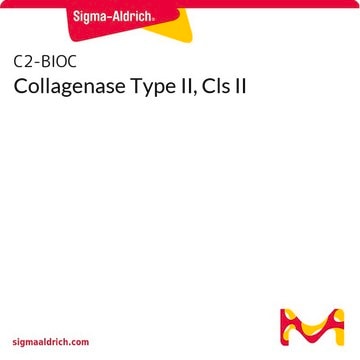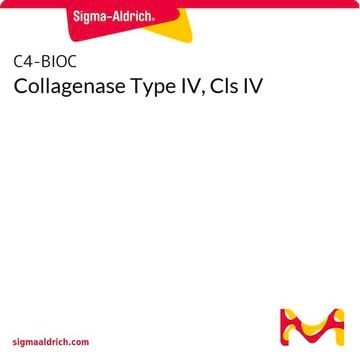C1764
Colagenasa from Clostridium histolyticum
0.2 μm filtered, suitable for release of physiologically active rat epididymal adipocytes, Type II-S, 0.5-5.0 FALGPA units/mg solid, ≥125 CDU/mg solid
Sinónimos:
Clostridiopeptidasa A
About This Item
Productos recomendados
Quality Level
sterility
0.2 μm filtered
type
Type II-S
form
lyophilized powder
specific activity
≥125 CDU/mg solid
0.5-5.0 FALGPA units/mg solid
mol wt
68-125 kDa
suitability
suitable for release of physiologically active rat epididymal adipocytes
application(s)
diagnostic assay manufacturing
storage temp.
−20°C
¿Está buscando productos similares? Visita Guía de comparación de productos
Application
Biochem/physiol Actions
Caution
Unit Definition
Preparation Note
substrate
signalword
Danger
hcodes
Hazard Classifications
Eye Irrit. 2 - Resp. Sens. 1 - Skin Irrit. 2 - STOT SE 3
target_organs
Respiratory system
Storage Class
11 - Combustible Solids
wgk_germany
WGK 1
flash_point_f
Not applicable
flash_point_c
Not applicable
ppe
dust mask type N95 (US), Eyeshields, Faceshields, Gloves
Certificados de análisis (COA)
Busque Certificados de análisis (COA) introduciendo el número de lote del producto. Los números de lote se encuentran en la etiqueta del producto después de las palabras «Lot» o «Batch»
¿Ya tiene este producto?
Encuentre la documentación para los productos que ha comprado recientemente en la Biblioteca de documentos.
Los clientes también vieron
Protocolos
To measure collagenase activity, N-(3-[2-Furyl]acryloyl)-Leu-Gly-Pro-Ala is used in a continuous spectrophotometric rate determination at 345 nm. Collagenase hydrolyzes collagen peptide bonds.
To measure collagenase activity, N-(3-[2-Furyl]acryloyl)-Leu-Gly-Pro-Ala is used in a continuous spectrophotometric rate determination at 345 nm. Collagenase hydrolyzes collagen peptide bonds.
To measure collagenase activity, N-(3-[2-Furyl]acryloyl)-Leu-Gly-Pro-Ala is used in a continuous spectrophotometric rate determination at 345 nm. Collagenase hydrolyzes collagen peptide bonds.
To measure collagenase activity, N-(3-[2-Furyl]acryloyl)-Leu-Gly-Pro-Ala is used in a continuous spectrophotometric rate determination at 345 nm. Collagenase hydrolyzes collagen peptide bonds.
Nuestro equipo de científicos tiene experiencia en todas las áreas de investigación: Ciencias de la vida, Ciencia de los materiales, Síntesis química, Cromatografía, Analítica y muchas otras.
Póngase en contacto con el Servicio técnico





